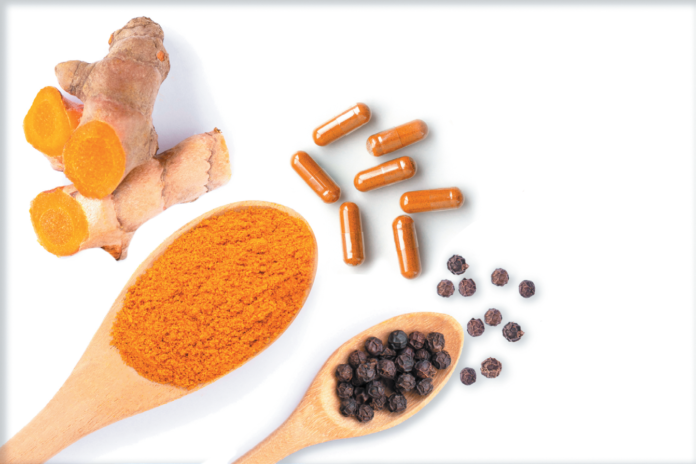Turmeric, the golden-orange spice commonly known for imparting a yellow hue to curries and mustards, is now trending in golden milk lattes, juice bar boosts, and dietary supplements. This plant rhizome, which resembles ginger root, has been used in traditional medicine for centuries. Today, curcumin, a polyphenol compound partly responsible for turmeric’s color, is getting a lot of attention from researchers for potential health benefits, including possible anti-inflammatory and anticancer activity.
What We Know. Studies in test tubes and mice suggest that, under certain conditions, curcumin has antioxidant, anti-inflammatory, anticancer, and neuroprotective activities. Clinical trials are underway to determine if these effects translate to health benefits in humans who ingest curcumin. These trials are looking at everything from arthritis, ulcerative colitis, and other inflammatory diseases, to depression, diabetes, Alzheimer’s disease, and several cancers (including colorectal, breast, prostate, and pancreatic). So far, well-designed studies are limited and there is no proof of effectiveness in preventing or treating any of these conditions.
One promising study concluded that curcumin (500 milligrams, three times a day) was as effective as the non-steroidal anti-inflammatory drug diclofenac (59 milligrams, twice daily) at relieving symptoms of knee osteoarthritis in adults ages 38 to 65. Experts caution, however, that this was one, small, short, unblinded study. The results are a start, but not proof that curcumin supplements will be safe and effective for all osteoarthritis sufferers. The evidence for other benefits is also very limited.
Challenges. A major barrier to curcumin’s effectiveness is its poor bioavailability. Most of the curcumin we ingest (in foods or in supplement form) is not absorbed by the body, and what does get absorbed is quickly eliminated. Researchers are exploring ways to increase the absorption of curcumin, such as combining it with piperine, the active ingredient in black pepper.
Supplement Savvy. Turmeric may be a healthy and tasty addition to one’s diet, but dietary intake is not sufficient to provide the levels of curcumin being studied for therapeutic benefits. To reach those levels, dietary supplements would be necessary. (For example, the 1,500 total milligrams of curcumin a day in the osteoarthritis study mentioned above is equivalent to about 7.5 teaspoons of turmeric, which is much more than anyone could safely ingest.) While we do not know for sure if curcumin supplements do any good, few safety concerns have arisen in the clinical trials conducted to date. If you are taking or plan take a supplement, be sure to follow the tips outlined in the Take Charge! box.
Spice it up. Turmeric is a tasty way to boost the flavor of foods without salt (even though the amount of curcumin you consume will not be similar to the amounts tested for health effects). Enjoy it in yellow curries, lentil dahls, and many other bright, delicious dishes. (See Turmeric Roasted Cauliflower with Tomatoes below.) Many plant foods (including other herbs and spices, fruits, vegetables, and whole grains) also contain potentially health-promoting phytochemicals. Overall dietary pattern, as opposed to supplement use, is the best way to support good health.
Try these tips if you are considering supplements containing turmeric:
- Avoid unproven claims. Understand that the potential health benefits of turmeric/curcumin remain unproven.
- Choose curcumin, not turmeric. A study found that turmeric powders are only around three percent curcumin.
- Tell your doctor before starting curcumin (or any) supplements. Curcumin can interact with medications, including anticoagulants.
- Check ingredients. If you do choose to take curcumin supplements, make sure they contain piperine or other ingredients proven to boost absorption.
- Look for third-party testing logos. Dietary supplements are not tested or regulated the way prescription drugs are. This means products may not contain the ingredients or concentrations claimed on the label. Look for seals from independent testers like ConsumerLab.com, NSF International, and U.S. Pharmacopeia (USP).
- Take with food. Taken on an empty stomach, curcumin supplements may cause gastritis and peptic ulcer disease. Additionally, curcumin is fat-soluble, so it will be better absorbed in the presence of fat (stick with plant fats over animal fats).
- Discontinue use if you note any adverse reactions, such as nausea, diarrhea, or headaches.
- Don’t take if pregnant or lactating. The safety of curcumin supplements in pregnancy and lactation has not been established.
- Put diet first. In addition to curcumin, other polyphenols also have health-promoting potential. Choose a diet rich in plant foods, including herbs and spices like turmeric, to reap all the health-promoting benefits of food.
























